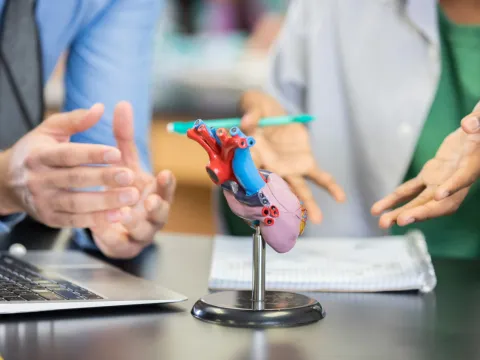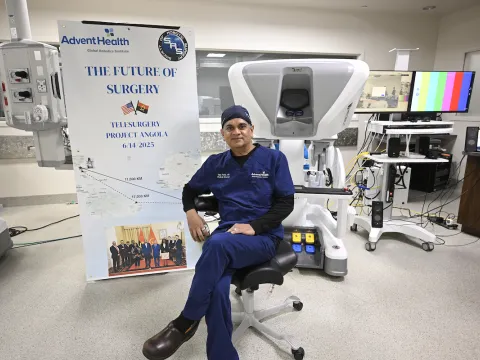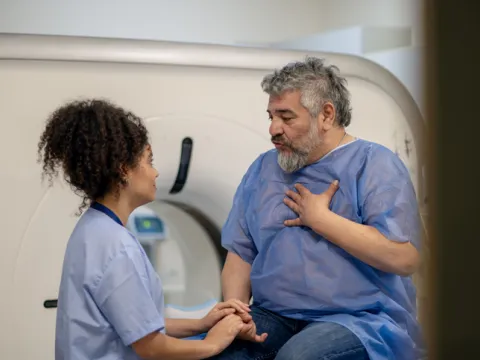- AdventHealth

Medical Microbiologist
Director of Microbiology Virology & Immunology
AdventHealth Central Florida
This Clinician's View is written by Jose Alexander, MD, Medical Microbiologist and Director of Microbiology, Virology and Immunology, AdventHealth Central Florida
In June 2024, a 32-year-old previously known patient was admitted to one of our hospitals from a long-term care facility. He had been seen for previous infections due to Klebsiella pneumoniae (K. pneumoniae) carrying a KPC resistant gene since November 2022, but this time the K. pneumoniae KPC was isolated from a blood culture with a very unusual resistant pattern. KPC is one of the most prevalent resistant mechanisms against carbapenems in Gram-negative bacteria. As a former clinically practicing physician who now works exclusively as a medical microbiologist, I know how challenging and frustrating these multidrug-resistant cases can be for care providers, never mind the extreme hardships and health challenges endured by the patient.
Fortunately, because AdventHealth became the first hospital-based microbiology lab in Florida and one of the first in the country to implement on-site, next-generation sequencing (NGS) technology in October 2023, we were ready for the challenge. Through the use of our new diagnostic tools, including whole genome sequencing (WGS) and multi-locus sequence typing (MLST), our team was able to determine this novel variant of K. pneumoniae called KPC-31, which we believe to be the first such case ever diagnosed in the state of Florida. The significance of this variant is its resistance against ceftazidime/avibactam, a well-known anti-KPC agent.
The identification of this new variant was certainly a significant and exciting scientific achievement for our lab. However, what was most important was the understanding we gained of this unique strain’s antimicrobial susceptibility and the speed with which we were able to inform the patient’s care team and provide direction on a different, targeted treatment approach to restore his health and quality of life.
Addressing the Global Threat of Treatment-Resistant Pathogens
The fight to combat antimicrobial resistance is not a new one, but there is increased urgency to take action. A recent study published in The Lancet forecasts that by 2050, more people will be dying from antimicrobial resistance than from cancer, with annual deaths potentially reaching 1.91 million. The culprits include a wide and growing range of mycobacteria and fungi. Historically, these organisms have been difficult and time-consuming to identify, let alone treat. Initial cultures alone could take 1-2 months. Then, when something was finally growing, we had to send it out for additional work-up, resulting in further delays. Too often, this delay left providers feeling helpless and the patient feeling hopeless with limited treatment options due to the lack of organism identification.
On-site next-generation sequencing (NGS) is revolutionizing our approach to these difficult cases. A DNA sequencing technology that rapidly and cost-effectively analyzes large amounts of DNA fragments, it enables the identification of genetic variations and mutations and can sequence thousands of specific genes or a whole genome in a short period of time. Used in oncology for many years to identify mutations and facilitate personalized treatment and precision medicine, NGS has more recently emerged as the gold standard within infectious disease medicine for performing comprehensive clinical diagnosis, research and surveillance.
Through our hospital-based microbiology laboratory at AdventHealth Orlando, we are now using NGS to perform several critical functions:
- Rapid and accurate identification of unknown pathogens, including mycobacteria and fungi
- Detection of genetic changes and antimicrobial resistance to inform and improve treatment strategies
- Investigation of potential cluster outbreaks to determine the source and implement effective infection control measures
Enhancing Value for Patients and Providers
The addition of on-site NGS capabilities to AdventHealth’s microbiology lab is also a case study in value-based care as it has significantly improved quality and efficiency while also reducing costs. Prior to implementation, we had to outsource all this testing to private laboratories. Identification of mycobacteria normally took a week or more after we had the organism growing on the plate. Now we have results in just 24 to 48 hours from a positive culture. This allows the clinician to provide targeted therapy sooner, and we know it will be specific for that organism even while we wait for the additional susceptibility testing, which can take a few more days.
As an example, if we have a problem with an antimicrobial resistant organism like Pseudomonas aeruginosa, our in-house NGS capabilities allow us to understand it from a genomic perspective. This helps our team determine the best in-vitro agents we already have available for testing and recommend them based on their clinical activity and indications. Collecting this cumulative data can then drive antimicrobial therapy before susceptibility tests are available. In addition, once a strain is identified, as in the K. pneumonia KPC-31 case, we can use metagenomic sequencing to develop direct diagnostic tools for future use.
Along with improving the speed and precision with which we can diagnose and treat, we are also reducing costs. In just the first year of conducting NGS testing in-house rather than sending it out to reference laboratories, AdventHealth has been able to save close to a quarter million dollars.
Collaborating to Continually Innovate and Improve
In our drive to combat the threat of treatment-resistant pathogens and deliver better care through technologies like NGS, we are working both within and outside our system to improve processes and grow our knowledge base.
Internally, our microbiology team has worked with clinicians, pharmacists and infection preventionists throughout the AdventHealth Central Florida system to establish new standards of care. Now, when we have a fungi or mycobacteria that is growing on a culture, we can automatically use NGS to identify it. This can be applied on a case-by-case basis or to streamline the protocol for epidemiological investigation. For example, if there is a cluster of infection in a unit and the infection prevention team has a high suspicion that there could be a potential outbreak, I'm immediately contacted to discuss these cases. Our team can then conduct whole genome sequencing to genomically compare the organisms and make sure they are related before escalating the investigation. If there is no molecular relatedness, there is no outbreak and no need to proceed with the investigation, which can be a time-consuming and resource-intensive process. In the last 18 months, our microbiology lab team has already been able to intervene in 5 potential clusters, fully ruling out 4.
Externally, we are collaborating with medical societies and other hospitals to explore applications of NGS to diagnosis, treatment and epidemiology protocols. I have presented some of AdventHealth’s experiences through publications and presentations to the American Society of Microbiology (ASM), the European Congress Clinical Microbiology and Infectious Disease (ECCMID), and at IDWeek, the joint annual meeting of the Infectious Diseases Society of America (IDSA), Society for Healthcare Epidemiology of America (SHEA), the HIV Medicine Association (HIVMA), the Pediatric Infectious Diseases Society (PIDS), and the Society of Infectious Diseases Pharmacists (SIDP). I’m also excited to report that through IDSA and ASM, a working group is forming to try to standardize some of the processes and understand where and how NGS will provide benefit. We also think the intelligence we are gathering about treatment-resistant organisms through our NGS capabilities could aid pharmaceutical companies in the development and testing of potential new antimicrobials.
Taking a Solution-Driven Approach to Addressing Current and Future Challenges
As the threat of treatment-resistant pathogens continues to loom and evolve, our work is never done. We learn from each case, innovating and adapting to try and stay several steps ahead. I believe technologies like NGS play an essential role in this battle and look forward to advancing its usage to help solve some of our greatest challenges.
At AdventHealth, we’re working to ensure that our microbiology laboratory functions as a comprehensive service, providing testing, consultation and guidance to our provider community so that together, we can make a real difference for patients. Down the road, we hope to expand our reach and serve as a reference laboratory for other hospitals outside our system.
I’m honored to serve alongside an amazing team that is committed to helping our patients feel whole and won’t take “no” for an answer when confronted with a complex case waiting for a solution. As I say, “At AdventHealth there is always an option after the last option for treating infectious diseases.”





